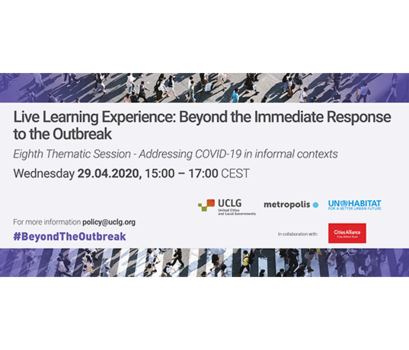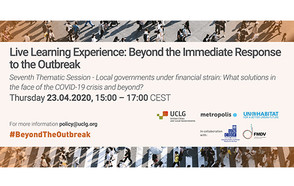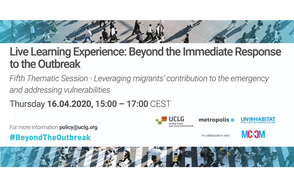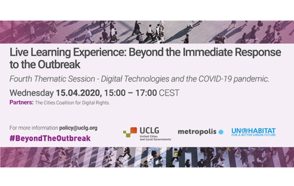
Banner photo credits by Ryoji Iwata.
Vulnerable and invisibilized populations, in particular those that live in informal settlements, and work in the informal economy, are among the most fragile affected by the pandemic. The Live Learning Session on Informalities and COVID-19 shed light on how to best respond to this immense challenge, from the local sphere, counting on our communities.
This Live Learning Session that took place on April 29 was organized in collaboration with Cities Alliance, and with partners from the World Bank, Habitat for Humanity; the private sector, Academia, and Habitat International Coalition.
Mayors, vice-mayors and councillors from a wide range of cities across the world, as well as representatives from national governments, shared their experiences and learning around the very real impact that COVID-19 was having in the informal sector in their cities, and how they were working to address it. Patricio Morera, Vice Minister, Ministry of Housing and Human Settlements, Costa Rica; Yvonne Aki-Sawyer, Mayor of Freetown; Noraini Roslan, Mayor of Subang Jaya; Rohey Malick Lowe; Mayor of Banjul; and Jesús Darío González, Secretary of Government of Cali.
The session also featured the participation of partners from civil society and representatives from the informal sector such as Jane Weru, Executive Director of the Akiba Mashinani Trust; Haija Mariam Iddrissu, President of REFELA Ghana, and Caroline Skinner, Director of Urban Research, WIEGO; as well as representatives from the Global Taskforce of Local and Regional Governments.
Maimunah Mohd Sharif, Under-Secretary-General of the United Nations and Executive Director of UN-Habitat, opened the session by stating that “2020 has started the decade of action for the 2030 Agenda, and we will not be able to move beyond this outbreak and towards a new normal if people in informality remain at risk.” She spelt out specific guidance for local governments in developing countries to plan and manage the new normal, with regard to housing, basic services, organizing markets and mobility and other matters that are most important for communities living in informal settlements.
Billy Cobbett, Director of Cities Alliance, welcomed the focus on informality. “It is important to put informal dwellers on the map, and in the budget. This is how change happens,” he said. He argued that short-term responses needed to be guided by a long-term approaches on the issues of access to land and also on the need for national, regional, and local governments to provide frameworks for the development of local skills.
Octavi de la Varga, Secretary General of Metropolis, provided the metropolitan approach to the relationship between informalities and COVID-19, and called for the need to rethink the model of development and bring about new approaches to governance, bringing to the table grassroots organizations that were working to provide services, and working on enhancing dialogue among them and national governments.
The first round table was facilitated by Anaclaudia Marinheiro Centeno Rossbach, regional adviser for Latin America and Caribbean Cities Alliance, and began with the intervention of Patricio Morera, Vice Minister from the Ministry of Housing and Human Settlements, Costa Rica, who laid out the protocol for dealing with the economic aspects of COVID-19 in informal settlements in her country, based on ending evictions, prioritizing national-local action plans, and enhancing basic service provision in informal settlements.
Yvonne Aki-Sawyer, Mayor of Freetown, stated that community outreach is key for the response, involving specific community groups and the most vulnerable populations in the preparation before the worst of the pandemic hits, and how slum upgrading and gender mainstreaming will be two essential topics in the reconstruction to ensure no communities are left behind.
Mayor of Subang Jaya, Noraini Roslan, argued that informal communities need to be empowered rather than judged, and called for the legalization of the informal sector, since it is an integral part of the economies of our cities. Jane Weru, Executive Director of the Akiba Mashinani Trust, argued that, while involving informal communities in the COVID-19 response is a must, it is essential to invest beforehand in planning, and including them in budgets.
Steve Weir, Habitat for Humanity, reminded the session of how the Town Hall process initiated in Durban had called for a change of narrative regarding informality. He highlighted that the goal was to develop a broader narrative, involving all stakeholders, with public-private people partnerships being an integral part of the co-creation necessary to transform societies.
The second round table was introduced by Emilia Saiz, Secretary General of UCLG, who picked up on the notion of co-creation and community involvement provided by the participants in the previous roundtable, and highlighted that “the pandemic has exacerbated some of the problems we had. We clearly need to address evictions, we need to make sure that the temporary measures that we take become permanent, and we need to make it clear that no sphere of government can do this alone”.
Emilia Saiz showcased the Decalogue for the Post-COVID19 era, which has been developed by UCLG, that provides measures for new governance in the aftermath with the 2030 Agenda as a framework, and called on participants to provide their visions under the 10 points developed in the document.
Jesús Darío González, Secretary of Government of Cali showcased the “the vaccine is in your hands” initiative, that had allowed for developing co-responsibility with informal communities, by allowing them to be the ones to react proactively to the outbreak.
Rohey Malick Lowe, Mayor of Banjul, also addressed the need to include the women and youth living in informal settlements in planning strategies, since their risk of infection is often higher, and thanked REFELA, the local elected women’s network of Africa, for their role in awareness raising among women in Africa, and in Banjul. Haija Mariam Iddrissu, President of REFELA Ghana also focused on the gender gap in informal communities, and how REFELA aims to provide information to women in informal communities to sensitize them to the issues around the virus and how to carry out preventive measures.
Involving communities in the reconstruction phase was a recurring theme for Caroline Skinner, Director of Urban Research, WIEGO, who addressed the need for monitoring what solutions informal workers had been developing in the midst of the pandemic, in particular on physical distancing, and water and waste management, and called on local governments to provide support to local communities.
Barbara Lipietz, Associate Professor at the Bartlett Development Planning Unit of University College London, highlighted how essential it is to shed light on alternatives and positive responses, to ensure a response to the crisis that also covers our structural vulnerabilities and thus brings us not to normality, but to a “better” normality.
Gérard Wolf, President of the Cities Taskforce, Movement of the Enterprises of France (MEDEF) provided the perspective of the private sector, highlighting the example of France, that had developed a coalition for basic services with all stakeholders, including national, local, and regional governments, as well as the private sector and NGOs.
Sameh Wahba, Global Director for the World Bank's Urban, Disaster Risk Management, Resilience and Land Global Practice presented the initiatives of the World Bank in partnering with informal communities and organizations such as Slum/Shack Dwellers International, and argued that the work that is being carried out now is a means to prepare for the new normality.
The final remarks during the session were provided by Adriana Allen, President of the Habitat International Coalition, who presented the lessons learnt, and called for the informal sector to be acknowledged as an integral part of cities. She argued that redistribution of resources would be integral to transform societies in the aftermath, and stated that considering data produced in informal environments would be key in enabling this redistribution.
Filiep Decorte, Chief Programme Development Branch at UN-Habitat, agreed on the need to consider all communities as equal parts of the city, and called for a coalition, with the New Urban Agenda and the SDGs as a framework, to ensure reconstruction programmes have a real impact.
The session was closed by representatives of the Global Taskforce of Local and Regional Governments. Greg Munro, Secretary General of the Commonwealth Local Government Forum called for the acknowledgement of the codependence of the formal and informal sectors; and Jean-Pierre Elong Mbassi, Secretary General of UCLG Africa, who argued for the need to provide a direct conduit to the more vulnerable populations to ensure they would have access to resources, and to change how partnerships are carried out so they benefit those that need them the most.
- Download the full press release here.
- Visit the #BeyondTheOutbreak dedicated page.
- Visit the CitiesForGlobalHealth platform.













